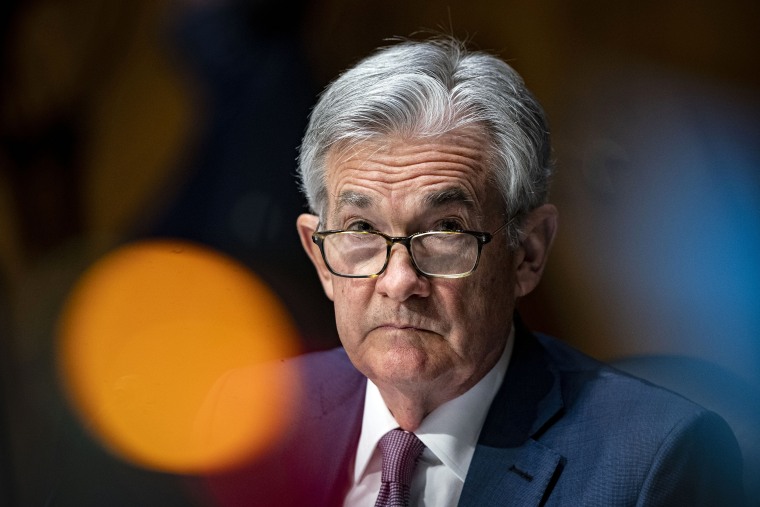As had been widely expected, the Federal Reserve announced it would keep its benchmark interest rate near zero when it concluded its two-day meeting of policymakers on Wednesday. Language in the Fed's post-meeting statement indicated for the first time that it will start withdrawing some of the emergency financial support for the economy.
Federal Reserve Chairman Jerome Powell said that the central bank could begin the process of scaling down its pandemic-era bond-buying programs, although he did not commit to a date.
“If progress continues broadly as expected, the Committee judges that a moderation in the pace of asset purchases may soon be warranted,” he said in a prepared statement.
At the start of the pandemic, the Fed committed to purchasing an open-ended amount of U.S. Treasury and mortgage bonds, which has provided much-needed stimulus through the worst of the Covid-19 recession. Wall Street had been expecting a signal of this tenor, with market participants anticipating a formal announcement about the wind-down following the Fed’s November meeting.
Powell’s messaging has been excruciatingly calibrated to avoid spooking markets: The Fed Chair is eager to avoid a repeat of the so-called “taper tantrum” of 2013, when Wall Street was surprised by the Fed’s decision to curtail its Great Recession-era bond-buying, triggering a market drop.
Consumers are seeing prices go up for gas, food, rent and restaurants — and they feel inflation is a real thing, whether the data shows it or not.
As such, the conversation around scaling back these purchases is one that consists of many steps and will unfold over a period of months, market observers say.
“They took the path of hinting at it, and delicately talking about it, and the markets have really adjusted to that,” said Dan North, senior economist at Euler Hermes North America.
Wall Street expects the winding-down process itself to take place over six to 12 months, said Craig Fehr, principal and investment strategist at Edward Jones. “A shorter timeline might raise the anxiety level a little bit,” he said.
Powell took pains Wednesday to decouple the bond taper from a rate increase, emphasizing that the two activities are not linked and that the threshold for raising interest rates is considerably higher than for scaling back emergency liquidity measures. He acknowledged that policymakers have differing perspectives when it comes to the start date as well as the speed of rate hikes, but played down the diverging viewpoints of officials.
There is “not really an unusually wide array of views about this,” Powell said, pointing out that only a single committee member thinks interest rates will still be at their current near-zero rate by the end of 2023, with a plurality expecting an increase only around 1 percent at that point.
An increasing number of Fed officials have expressed more hawkish viewpoints — an outlook that has evolved over the summer as the labor market began to show signs of improvement and inflationary metrics rose. For these policymakers, worry about pockets of inflation becoming entrenched overshadows concern that paring policy accommodation will weaken the economy.
Economists point out that one of the trickiest things about inflation is that it can be fueled by sentiment and expectations more than actual macroeconomic data.
“For consumers, they know what they see and they know that they're seeing prices go up — they see gas and they see food and they see rent and they see restaurants,” said Tom Martin, senior portfolio manager at Globalt Investments. “The feeling is that inflation is a real thing and will probably last longer than the Fed is saying. It’s in the Fed's best interest to talk down those risks.”
Worry over the economic impact of the delta variant and market jitters about the showdown in Washington, D.C., over the debt ceiling have also injected a note of uncertainty that Fed officials and investors alike must navigate.
In response to press questions, Powell urged Congress to raise the debt ceiling and not risk the U.S. dollar’s status as the world’s reserve currency, a position also forcefully expressed by Treasury Secretary Janet Yellen, and demurred on a question about the possibility of being reappointed by President Joe Biden next year.
Powell also fielded questions about the revelation that two regional Fed Presidents had held or traded assets last year whose prices could have been influenced by the central bank’s activities. He said he hadn’t known that Dallas Fed President Robert Kaplan or Boston Fed President Eric Rosengren had engaged in these activities, saying, “I was not aware of the specifics of what they were doing.”
He reiterated his commitment to a “comprehensive review” of the agency’s ethics rules and prohibitions, saying this was necessary to maintain the Fed’s reputation of independence and public trust in the institution. “The trust of the American people is essential,” he said.
On the subject of cryptocurrency, Powell said the central bank is studying whether or not to develop a digital currency, with a paper on the topic near completion, he said. When asked if the U.S. risked falling behind other nations' digital-currency intitiatives, Powell expressed satisfaction with the Fed's current pace. "It's more important to do it right than do it fast," he said.
